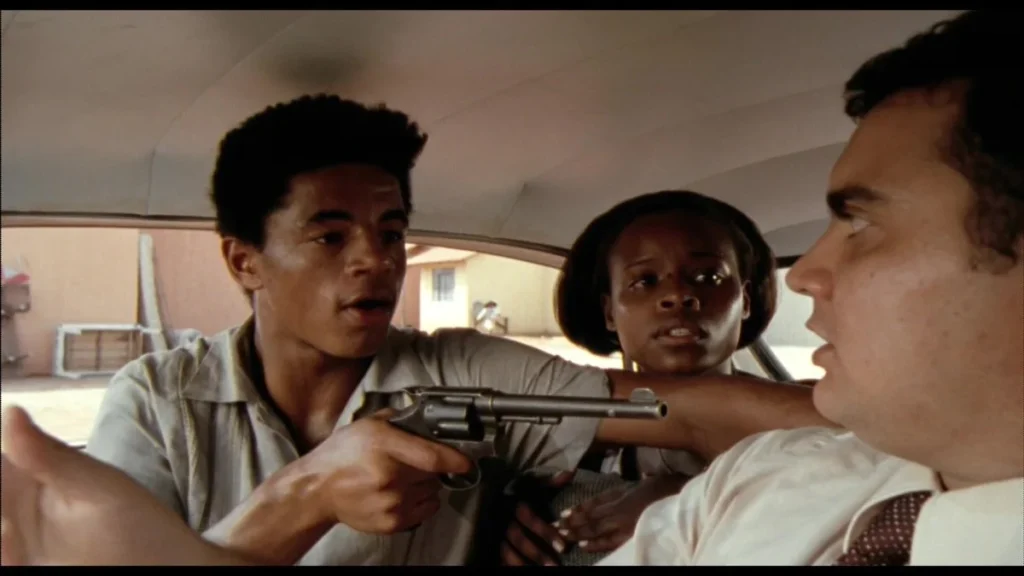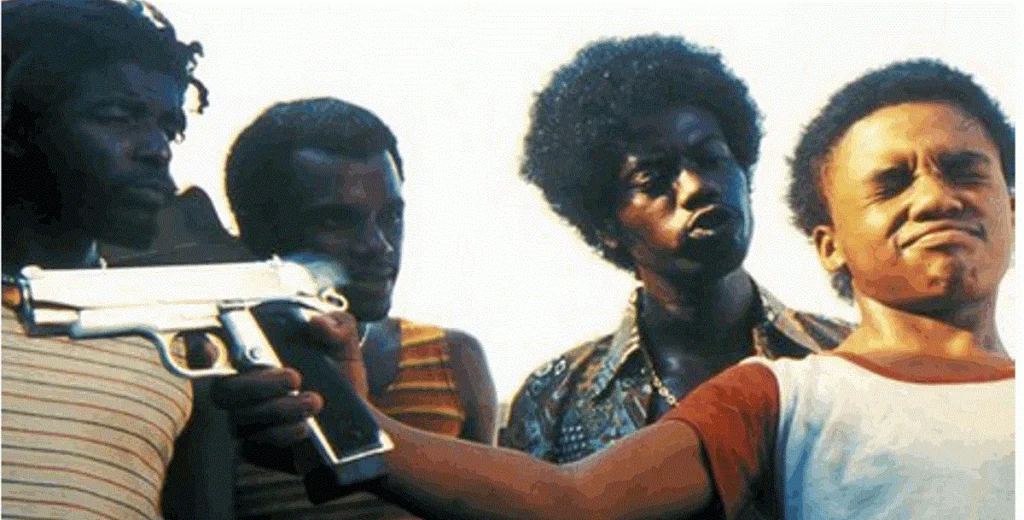Genres: Drama, Crime
Runtime: 2h 10m
Directors: Fernando Meirelles, Kátia Lund (co-director)
Writers: Paulo Lins (novel), Bráulio Mantovani (screenplay)
Stars: Alexandre Rodrigues, Leandro Firmino, Phellipe Haagensen
Release Date: August 30, 2002
IMDB Rating: 8.6/10
Rotten Tomatoes Rating: 91%
JustWatch Rating: 97%
Box Office Collection: $30.6 million
Famous Quote: “In the City of God, if you run, the beast catches; if you stay, the beast eats.” – Buscapé (Rocket)
Where to Watch: Google Play Movies, YouTube Movies
In the sprawling city of Rio de Janeiro, where samba rhythms meet the hustle of daily life, lies a world rarely seen by tourists—a world captured brilliantly in “City of God” (2002). This film isn’t your typical Rio postcard; instead, it peels back the layers of the city’s underbelly with a mix of gritty realism and cinematic flair. Imagine if Tarantino and Scorsese took a trip to Brazil and decided to make a movie—it might look something like this.
Set in the pulsating favelas, or slums, “City of God” tells the story of Rocket, a young aspiring photographer caught in the chaotic crossfire of gang wars and survival. It’s a tale where childhood innocence collides head-on with the harsh realities of poverty and crime, all framed against the backdrop of Rio’s stunning but unforgiving landscape. The film’s narrative punches are as sharp as a bossa nova beat, weaving through intertwining lives and complex motivations with the precision of a capoeira master.
But don’t let the intense subject matter fool you; “City of God” isn’t just about crime and struggle—it’s also about resilience, hope, and the human spirit’s indomitable will to rise above adversity. So, grab your caipirinha, settle into your hammock, and get ready to explore Rio’s darker side with a dose of humor and a lot of heart. Because in the city of God, every story, no matter how tough, has a rhythm that’s uniquely Brazilian.
Brief overview of the film’s setting and premise:
City of God” (2002) is set in the notorious favelas (slums) of Rio de Janeiro, Brazil, specifically in the neighborhood of Cidade de Deus (City of God). The film spans several decades, starting in the 1960s and continuing into the 1980s, capturing the rise of organized crime and the effects of poverty on the lives of its residents. It revolves around the intertwined lives of various characters, primarily Rocket, a young aspiring photographer, and his childhood friend Lil’ Ze, a violent and ambitious gang leader. The narrative explores themes of survival, violence, and the struggle for identity in a harsh urban environment where the line between good and evil often blurs. As Rocket navigates his way through the chaotic and dangerous streets, he becomes both observer and participant in the unfolding drama of crime, loyalty, and betrayal, ultimately seeking a way out through his passion for photography. The film’s setting is integral to its storytelling, portraying Rio’s vibrant culture alongside its dark underbelly with raw intensity and authenticity.
Introduction to the Setting and Plot:

Suggested Read: Top 10 Drama Movies Of All Time
Setting the Scene: “City of God” unfolds in the eponymous favela, where the sprawling urban landscape becomes a character in itself—its narrow alleys and crowded houses setting the stage for the unfolding drama. The narrative spans from the 1960s to the 1980s, tracing the lives of characters caught in the cycle of poverty, drugs, and crime.
Plot Overview: The story centers around Rocket (Alexandre Rodrigues), a young aspiring photographer navigating the perilous streets of City of God. As he captures the unfolding chaos through his lens, Rocket becomes an unwitting chronicler of the favela’s brutal gang wars led by the charismatic and ruthless Li’l Zé (Leandro Firmino da Hora). Through Rocket’s perspective, the film explores themes of ambition, survival, and the moral dilemmas faced by those living on the fringes of society.
Themes Explored:
Youth and Innocence Lost: The film portrays the loss of innocence among its young characters, who are drawn into the cycle of violence and crime from an early age. It examines how social and economic factors shape their choices and destinies, highlighting the stark realities faced by marginalized communities.
Power and Corruption: Central to the narrative is the rise of Li’l Zé and his quest for dominance over the favela’s drug trade. The film delves into the corrupting influence of power and the moral compromises made in pursuit of control, revealing the brutal consequences for those caught in its grip.
Community and Identity: “City of God” explores the complexities of community dynamics within the favela, where loyalty and betrayal coexist amidst poverty and adversity. It reflects on the resilience and sense of belonging that bind residents together, even as they confront daily challenges and existential threats.
Character Analysis:
Alexandre Rodrigues as Rocket (Buscapé)
- Character: A young aspiring photographer who grows up in the City of God and narrates the film.
- Performance: Rodrigues delivers a compelling and nuanced performance, capturing Rocket’s curiosity, ambition, and struggle to escape the violence around him. His portrayal serves as the emotional anchor of the film, providing both a personal and observational perspective on the chaos.
Leandro Firmino as Li’l Zé (Zé Pequeno)
- Character: A ruthless and ambitious gang leader who rises to power in the City of God.
- Performance: Firmino gives a chilling and intense performance, embodying the terrifying and unpredictable nature of Li’l Zé. His portrayal is both captivating and horrifying, making Li’l Zé one of the most memorable villains in cinema.
Phellipe Haagensen as Benny (Bené)
- Character: Li’l Zé’s best friend and right-hand man, who dreams of a more peaceful life.
- Performance: Haagensen’s performance is charismatic and endearing, providing a contrast to Li’l Zé’s brutality. His portrayal of Benny’s internal conflict and desire for change adds depth to the film’s exploration of choices and consequences.
Douglas Silva as Li’l Dice (Dadinho)
- Character: The younger version of Li’l Zé, who starts as a mischievous child and evolves into a violent criminal.
- Performance: Silva’s portrayal is haunting and effective, capturing the early signs of Li’l Zé’s psychopathy. His performance lays the groundwork for the character’s development into a feared gang leader.
Jonathan Haagensen as Shaggy (Cabeleira)
- Character: A leader of the Tender Trio, an early gang in the City of God, and Benny’s older brother.
- Performance: Haagensen delivers a strong performance, showcasing Shaggy’s charisma and leadership qualities. His portrayal highlights the early days of gang activity in the favela and the impact on younger generations.
Matheus Nachtergaele as Carrot (Sandro Cenoura)
- Character: A rival gang leader who becomes an ally of Benny.
- Performance: Nachtergaele’s performance is dynamic and layered, portraying Carrot as both a cunning criminal and a pragmatic survivor. His interactions with other characters add complexity to the gang dynamics in the film.
Seu Jorge as Knockout Ned (Mané Galinha)
- Character: A peaceful man who turns to violence after a personal tragedy and becomes a key figure in the gang wars.
- Performance: Seu Jorge delivers a powerful and emotional performance, capturing Ned’s transformation from a gentle soul to a vengeful fighter. His portrayal adds a tragic dimension to the film’s narrative.
Alice Braga as Angélica
- Character: Rocket’s love interest and a symbol of his aspirations for a better life.
- Performance: Braga’s performance is subtle and heartfelt, providing a sense of hope and normalcy in Rocket’s turbulent world. Her chemistry with Rodrigues enhances the film’s emotional depth.
Roberta Rodrigues as Berenice
- Character: One of Li’l Zé’s girlfriends, who is caught up in the violent lifestyle.
- Performance: Rodrigues brings a sense of vulnerability and realism to her role, highlighting the impact of the violent environment on women in the favela.
Jefechander Suplino as Clipper
- Character: A member of the Tender Trio who eventually seeks a way out of the criminal life.
- Performance: Suplino’s portrayal is earnest and sincere, depicting Clipper’s struggle to find redemption and a better path.
Renato de Souza as Goose (Marreco)
- Character: Rocket’s older brother and a member of the Tender Trio.
- Performance: De Souza’s performance is impactful, showing Goose’s influence on Rocket and his tragic fate, which propels Rocket’s desire to escape the favela.
Edson Oliveira as Stringy (Alicate)
- Character: Another member of the Tender Trio, involved in petty crimes.
- Performance: Oliveira’s portrayal adds to the depiction of the early stages of criminal activity in the City of God, contributing to the film’s historical context.
Cinematic Techniques:
Visual Style: Meirelles and Lund employ dynamic camerawork and editing techniques to immerse viewers in the frenetic energy and raw emotions of City of God. The use of handheld cameras and kinetic editing underscores the urgency and immediacy of the narrative, enhancing its realism and emotional impact.
Narrative Structure: The film’s non-linear narrative enhances its storytelling by weaving together multiple perspectives and timelines, providing a comprehensive portrait of life in City of God. This approach enriches character development and thematic exploration, offering viewers a nuanced understanding of the favela’s socio-economic landscape.
Iconic Scenes and Quotes of City of God (2002)
Iconic Scenes:
- The opening chase sequence through the favela, establishing the film’s frenetic pace and chaotic atmosphere.
- Li’l Zé’s chilling initiation into violence, marking a pivotal moment in his transformation from a young boy to a hardened criminal leader.
- Rocket’s poignant photography sessions, capturing moments of vulnerability and resilience amidst the turmoil.
Memorable Quotes:
- “It was like a message from God: ‘Honesty doesn’t pay, sucker.'” – Rocket
- “The weak are meat, and the strong do eat.” – Li’l Zé
Impact and Legacy:

Critical Acclaim: “City of God” garnered widespread acclaim for its bold storytelling, visceral performances, and socio-political commentary. It received multiple awards and nominations, solidifying its status as a seminal work in Brazilian and international cinema.
Cultural Influence: The film’s portrayal of urban poverty, crime, and resilience resonated with audiences worldwide, sparking discussions on socio-economic disparity and the human cost of systemic neglect. It inspired subsequent filmmakers to explore similar themes and narratives within their own cultural contexts.
Enduring Legacy: Decades after its release, “City of God” continues to be celebrated for its artistic merit and thematic depth. Its portrayal of marginalized communities and the ethical dilemmas faced by its characters remains relevant, offering a timeless reflection on the universal pursuit of survival and dignity.
Conclusion
“City of God” (2002) stands as a poignant testament to the human spirit’s resilience amidst adversity. Through its gripping narrative, complex characters, and immersive storytelling, the film invites viewers to confront the harsh realities of urban poverty and the enduring quest for identity and justice within the favelas of Rio de Janeiro. Fernando Meirelles and Kátia Lund’s direction, coupled with stellar performances and evocative cinematography, ensures that “City of God” remains a powerful and enduring cinematic experience that transcends geographical boundaries and cultural divides.

Anas Chaudhary is a writer at Entertainment 24 Seven, specializing in entertainment news, facts, and trends. He brings a fresh perspective and engaging storytelling to his coverage of the latest happenings in the entertainment world.

